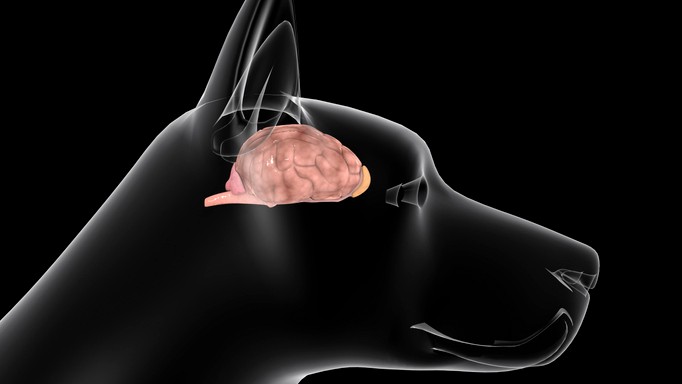Are cats smarter than dogs? What does science say?
Ever wondered “are cats smarter than dogs?”. Then let's see what the experts say and also compare their brain sizes

Our feline friends are capable of doing amazing things but are cats smarter than dogs? You may think so considering they're able to convey their mood with a swish of their tail, make more than 100 sounds, land on their feet and find their way to your house thanks to a special homing instinct.
But then dogs have advanced memory skills, can read human body language, understand what we're asking them to do and show an emotional connection. As such, this is clearly a question that isn't going to be answered with a simple “yes” or “no” – nor one that even the best cat puzzle feeder or best dog puzzle toys is going to resolve.
Indeed, over the years, many people have attempted to get to the bottom of the issue, not least scientists who have conducted numerous comparative studies between cats and dogs. One thing we do know with great certainty is that dogs are intelligent. In fact, canine researcher Stanley Coren puts them on a par with a two-year-old human.
For cats to be smarter than dogs, they're going to have to do better than that, but it's not quite so straightforward. When studying intelligence in animals, researchers tend to look at different aspects of cognition and it's not as easy as creating categories and ticking boxes.
Coren measured dog intelligence according to instinct, adaptability and obedience, for instance. He said the average dog could learn 165 words, with the best learning 250. He also said dogs could count up to five and were capable of deliberately trying to deceive in order to get rewards.

But just because cats only understand about 40 words at most and can only likely count to four, does that make them less smart? Brian Hare, a professor of evolutionary anthropology at Duke University, reckons not, and he’d frequently quoted as saying it's like “asking whether a hammer is a better tool than a screwdriver – it depends on what it was designed for.”
In other words, cats and dogs are smart in their own ways based on what they need to do. Cats have a good handle on meal times, for instance, and they can often sense when something is going to happen and prepare themselves. They are also more independently-minded and rely far less on humans.
Get the best advice, tips and top tech for your beloved Pets
Dogs, on the other hand, are people pleasers. They'll come when called and perform the tasks required of them. But look what happens when left to their own devices. A study at Eötvös Loránd University in Budapest, Hungary, in 2006 demonstrated that cats will stick at trying to solve a puzzle long after a dog has sought human assistance.
What all of this means is that direct intelligence comparisons are very difficult to make. For some tasks, cats and dogs perform equally well: for example, a study which involved hiding food and pointing at its whereabouts found that both types of pet could use the cue to find it. Yet the study also found that “cats lacked some components of attention-getting behavior compared with dogs.” What’s more, there haven’t actually been that many studies directly pitting cats against dogs.
How big are cats brains?
Maybe one of the better indications of intelligence could be a comparison of brain size. We say “could” because a firm link suggesting bigger brains are smarter has never actually been proven.
A 2018 study showed people with a larger mass of gray matter “rated higher on measures of intelligence and educational attainment”. But other factors were also at play and “size was far from everything”. We can assume the same for pets.
Still, there are at least size differences. A domesticated cat brain is about two inches long (five centimeters), weighing an average of 0.88 to 1.06 ounces (25 to 30 grams). It occupies about 0.9 percent of a cat's body mass and that compares unfavorably to our own brains which take up about two percent of our total body mass.
Interestingly, cat brains are actually getting tinier. A recent study in the Royal Society Open Science journal compared the brain cavity size of a modern house cat to two closest wild ancestors and found it to be smaller.
But cats are not alone in this. The size of a dog's brain has also reduced since being domesticated thousands of years ago. Oh, and human brains are five percent smaller when compared to Neanderthals so we’re not exempt either. Ug!

How big are dogs brains?
So how do dogs compare? Well, a dog's brain is about the size of a lemon but it differs depending on the breed. In general, the brain occupies about 1.125 percent of a dog's total body mass but the crucial statistics relate to the number of neurons in the cerebral cortex.
A study published in the journal Frontiers in Neuroanatomy in 2017 showed that dogs rather than cats have the most neurons. It pointed out that the cerebral cortex is linked to intelligence because it controls complex thought processes which include planning, memory, association and decision-making.
Now, human cortexes have 16 billion neurons. Dogs, on the other hand, vary according to breed but a mixed breed had 429 million and a golden retriever had 623 million – far less than us.
Is that better or worse than cats? Well, cats have 250 million neurons in their cerebral cortex and, on that basis, you could conclude that dogs are smarter than cats or at least more cognitively capable. And if you’re looking for further comparisons, on that basis, a domestic cat is on a par with bears while dogs are on a par with lions and raccoons (odd, perhaps, given lions and cats are family!).
How big are dogs brains?
So how do dogs compare? Well, a dog's brain is about the size of a lemon but it differs depending on the breed. In general, the brain occupies about 1.125 percent of a dog's total body mass but the crucial statistics relate to the number of neurons in the cerebral cortex.
A study published in the journal Frontiers in Neuroanatomy in 2017 showed that dogs rather than cats have the most neurons. It pointed out that the cerebral cortex is linked to intelligence because it controls complex thought processes which include planning, memory, association and decision-making.
Now, human cortexes have 16 billion neurons. Dogs, on the other hand, vary according to breed but a mixed breed had 429 million and a golden retriever had 623 million – far less than us.
Is that better or worse than cats? Well, cats have 250 million neurons in their cerebral cortex and, on that basis, you could conclude that dogs are smarter than cats or at least more cognitively capable. And if you’re looking for further comparisons, on that basis, a domestic cat is on a par with bears while dogs are on a par with lions and raccoons (odd, perhaps, given lions and cats are family!).

So are cats smarter than dogs?
Maybe not. On the basis of neurons it would indeed seem to be the other way around, as we've just seen. But comparisons aren't actually helpful because our pets have their own level of smartness and intelligence manifests itself in various ways (look at the different levels of intelligence among humans with people skilled and talented in various ways).
It's also worth pointing out that, just as different dogs are seen to be more intelligent than others (Coren's The Intelligence of Dogs ranks Border Collies, Poodles, German Shepherds, Golden Retrievers and Doberman Pinschers as the top five) so too are different cats. Bengals, Abyssinians and Siamese, for instance, are smart social cookies who are able to learn and perform tricks.
In that sense, you should do all you can to mentally stimulate your cat, starting by following our 10 tips to keep your feline friend occupied. Similarly, it's vitally important to keep your canine occupied – so if you've ever wondered, “do dogs get bored?”, the answer is yes and there are ways to keep their minds ticking over, too.
By engaging with pets, regardless of type, you'll learn far more about them, drawing their personality and talents to the surface. In fact, experts suggest that the difference in intelligence could be down to how we treat our pets. Exposing them to new experiences and socializing them well could make all the difference to how smart cats and dogs become in the future.

David Crookes has been a journalist for almost 30 years and he has written for a host of magazines, newspapers, websites and books including the World of Animals Annual, BBC Earth, Live Science, The Independent and Tom’s Guide.
Born in England, he lives with two cats but he’s also keenly interested in the differences between the huge number of dog breeds – in fact, you can read many of his breed guides that he’s written in collaboration with vets here on PetsRadar.
With a lifelong passion for technology, too, he’s always on the lookout for useful devices that will allow people to keep their pets happier and healthier, and provide them more time to spend together.
David has a degree from Durham University, as well as postgraduate diploma in journalism from the University of Central Lancashire.
